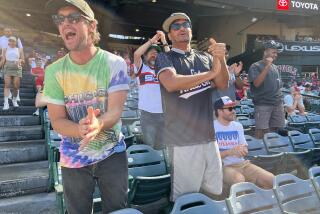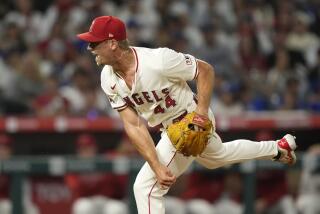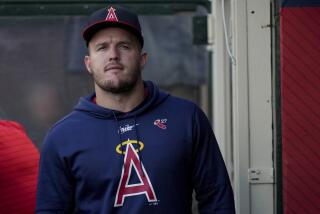Major Desperation
NEWARK, N.J. — Across the Hudson River from the megawatt skyline of Manhattan, Jose Canseco plays on a field of last chances. The corrosion of age has stranded him with a collection of has-beens and die-hard dreamers on a minor league baseball team playing in New York’s shadow. For Canseco, the city on the far side of the river--where he played last season with the Yankees--might as well be an ocean away.
The 36-year-old power hitter burns to find a way back to the superstar’s life that was his routine for 15 years in the majors. Desperate, he has joined the Newark Bears, a team in the independent Atlantic League, to showcase his dimming talents for any major league team in need of a slugger. So far, there are no takers.
Cut by the Angels in spring training this year, Canseco’s pursuit of 500 home runs--the magic mark, he figures, that would put him in Cooperstown--fell 54 short. One more fling at major league success--just two years, tops--would be enough. Then he could consider retirement.
“Five hundred, of course I want to get there. That’s Hall of Fame, man,” he said after a long night game played before a sparse crowd.
But glaring into the New Jersey mist from home plate, all he can see is the river and the major league city beyond.
It is a strange sort of afterlife, this baseball purgatory.
Canseco is still too convinced by the air-slicing arc of his swing to give up--and too proud to accept demotion to the minors and a contract yoking him to one team. Instead, he is taking his chances with a club that promises to provide steady, unspectacular wages and a stage where he can work at keeping his baseball talents sharp enough to eventually attract attention from a top team.
“You want people to notice,” Canseco said. Once, he had no trouble at that. He dated Madonna. He had several minor brushes with the law. He has heard, he said, that scouts were in the stands recently. Someone from the Chicago White Sox. But the scout came and went, and Canseco was still with the Bears.
The Bears’ owner, former Yankee catcher Rick Cerone, understands all too well the impatience that seethes inside Canseco.
“Baseball’s no different than any other profession, and in some ways it’s worse,” Cerone said. “In your late 30s, you’re considered an old man. It’s a hard thing to take. If Jose says he’s not there yet, we’re happy to have him around, even if it’s only for a ticket out of here.”
Cerone expects Canseco will be picked up by the fall. So does Canseco. But only eight Atlantic League players have made it to the majors since the league’s formation in 1998, team officials say. All of them had to go first to a triple-A team--a stopover Canseco insists he will bypass.
“When I go, I go straight,” he said.
It would be a first in a league populated with journeymen and former stars who can’t get baseball out of their blood. But then Canseco has already managed a first for the league--he is paid $6,000 a month. It is a pittance compared with the $5 million-a-year contract he won at the height of his powers, but double the league’s maximum salary. Cerone says his team pays Canseco only $3,000--and declines to comment on reports that the league pays the rest of the slugger’s monthly wages to keep him on as an attendance draw.
The Bears are a team studded with dwarfed stars. Each night, after their games, men whose exploits were once a staple on national television now watch their younger successors on video highlights.
After a recent loss to a team from Somerset, Mass., Canseco stared at the clubhouse television screen, watching the day’s action like an exile reading a hometown paper. So was journeyman Jim Leyritz, who joined the Bears for a month hoping he might return to the majors. So were former outfielder Lance Johnson and his former teammate, Jaime Navarro, when the two were with the White Sox.
So too was Canseco’s twin brother, Ozzie, who became a Bear after a fitful pro career. The twins are dead ringers for each other--same machine-press jaws, same tapered weightlifter’s physiques, same lumbering gait.
“Do I miss it? What do you think?” Jose Canseco said. “You’d think some team could use me. I haven’t lost a thing.”
When Canseco was cut loose by the Angels in March, team officials spoke bluntly about an accumulation of invisible flaws. Canseco insisted he was in fine health and ready for his 16th season. But the Angels said his brute strength was ebbing in subtle ways. The sense of menace he posed to major league pitchers was flagging.
“It was deeper than numbers,” Angel spokesman Tim Mead explained, crafting his words. “There were concerns about his bat speed, his ability to move in the field. Certain holes began showing up.”
But Angel Manager Mike Sciosia’s comments questioning Canseco’s “long-term health” touched a nerve that is still raw. Canseco, who underwent surgery for a herniated disk in 1999 and was bothered by lower back and hamstring problems, felt the Angels’ remarks purposely left the impression that he was “damaged goods.”
“I’m still wondering why they handled it the way they did,” Canseco said. “I’ve never had anyone question my health like that before.”
Only a year ago, the Cuban-born Canseco was still considered dangerous enough to persuade Yankee management to claim him off waivers from the Tampa Bay Devil Rays and add his bat to their lineup, though he had only one at-bat in the postseason.
Two years earlier, he had hit 46 home runs for Toronto, the latest in a career of milestones. Canseco was rookie of the year in 1986 and most valuable player in 1988 with Oakland. He led the American League in home runs in 1988 and tied for the lead in 1991--bruising, towering clouts that led teammates and fans to dub him one of the two “Bash Brothers” along with former Athletic Mark McGwire.
But while McGwire put up Hall of Fame numbers in his last several seasons for St. Louis, Canseco’s output shrank--34 in 1999 and 15 in 2000. If Big Mac is a consensus choice for Cooperstown with 556 home runs, Canseco reckons his only shot at a legacy is to reach the same vaunted level.
On a rainy Thursday night, a smattering of Canseco fans came to Newark’s riverfront stadium, hoping to see one of his trademark swats. The loyalists were not hard to find. The paid attendance in the 6,000-capacity Ballpark at Harbor Yard is 2,600, but the soft, steady rain kept many at home.
Beyond the left-field wall, commuter trains thudded by toward Manhattan. The dim whisk of traffic droned from Interstate 95. People had other things to do besides sit in the mist and watch a struggling team and a big man’s attempt to prove his worth one more time.
Canseco took the field, oblivious to the small knot of fans who hung at the first-base line, hoping for an autograph, a snatch of conversation.
Shawn Hackett, 22, a bruiser whose biceps were almost as thick as Canseco’s, wore the Bash Brother’s Yankee number, 33, on his shirt. Nearby sat Mark Petrillo, 26, a devotee who runs a Canseco Web site. Petrillo had driven in the rain all the way from Harrisburg, Pa., to watch his fallen hero.
The big man signed a few baseballs nearby, but trotted off, silently, before he reached his fans. “Jose! Jose, please!” Hackett bellowed. But the outfielder was already gone.
In his first at-bat, Canseco lofted the ball into deep center field for a double. Two more trips to the plate resulted in long outs. In 23, games, Canseco is hitting .264 with four home runs and 18 runs batted in. It is a struggle, he admitted.
Even Leyritz, who is batting .296, still waits for a call from the majors. The worst torture, he said, is playing well and seeing nothing come from it. “It’s my heart, not my head, that keeps me here,” he said.
Ozzie Canseco hit 44 home runs last year for the Bears. No one has called him either. When he heard about Jose’s release by the Angels, he phoned his brother and urged him to join him in Newark.
“I’m trying to help him make the transition,” said Ozzie, who is rooming with Jose in a local hotel. The room is temporary, like their planned stay with the Bears. But Ozzie too feels the dull ache of age that eats at his brother.
“You give your all, but you feel it the next day,” Ozzie said. “Your bones hurt, your joints are stiff. Not like when you were a kid. But that doesn’t mean you can’t come back.”
“Hey, Jose’s still got it,” Petrillo insisted from the stands. “Look at the swing. Every time he rips, it could be gone. He’s the glory of the home run in person. There’s drama in that swing.”
In the clubhouse afterward, Jose Canseco agreed. “You saw where those balls went,” he said. “Does that look like lost bat speed? I’m healthy and I’m ready.”
The big man already has convinced himself.
But it is only a first step, his way of steeling himself to trot out onto a strange field every night. At the plate, Jose Canseco stands there, gazing out at distant lights, still waiting to cross the river.
(BEGIN TEXT OF INFOBOX / INFOGRAPHIC)
A Bash Statement
Jose Canseco says a 500-home run career would be his ticket to the Hall of Fame. Fourteen members of the 500-home run club are in the Hall of Fame, with Eddie Murray--at No. 17 and 503 home runs--eligible to be on the ballot next year, and Mark McGwire (No. 7 at 556) and Barry Bonds (No. 11 at 522) still playing. Twelve of the next 33 players on the all-time home run list (top 50) are in the Hall of Fame (in boldface type), and eight are still playing (denoted by asterisk).
18. Lou Gehrig: 493
19t Willie Stargell: 475
19t Stan Musial: 475
21. Dave Winfield: 465
22. Carl Yastrzemski: 452
23. *Jose Canseco: 446
24. Dave Kingman: 442
25t Andre Dawson: 438
25t *Ken Griffey Jr.: 438
27. Billy Williams: 426
28. *Fred McGriff: 425
29. *Cal Ripken Jr.: 419
30. Darrell Evans: 414
31. *Rafael Palmeiro: 413
32. Duke Snider: 407
33. *Sammy Sosa: 400
34. Al Kaline: 399
35. Dale Murphy: 398
36. Joe Carter: 396
37. Graig Nettles: 390
38. Johnny Bench: 389
39. Dwight Evans: 385
40. *Harold Baines: 384
41t Frank Howard: 382
41t Jim Rice: 382
43. Albert Belle: 381
44t Orlando Cepeda: 379
44t Tony Perez: 379
46. Norm Cash: 377
47. Carlton Fisk: 376
48. *Juan Gonzalez: 375
49. Rocky Colavito: 374
50. Gil Hodges: 370
Note--Eight of the next 27 players on the all-time home run list (with 300 as the cutoff) are in the Hall of Fame--Ralph Kiner (369), Joe DiMaggio (361), Johnny Mize (359), Yogi Berra (358), Hank Greenberg (331), George Brett (317), Al Simmons (307) and Rogers Hornsby (301).
More to Read
Go beyond the scoreboard
Get the latest on L.A.'s teams in the daily Sports Report newsletter.
You may occasionally receive promotional content from the Los Angeles Times.






